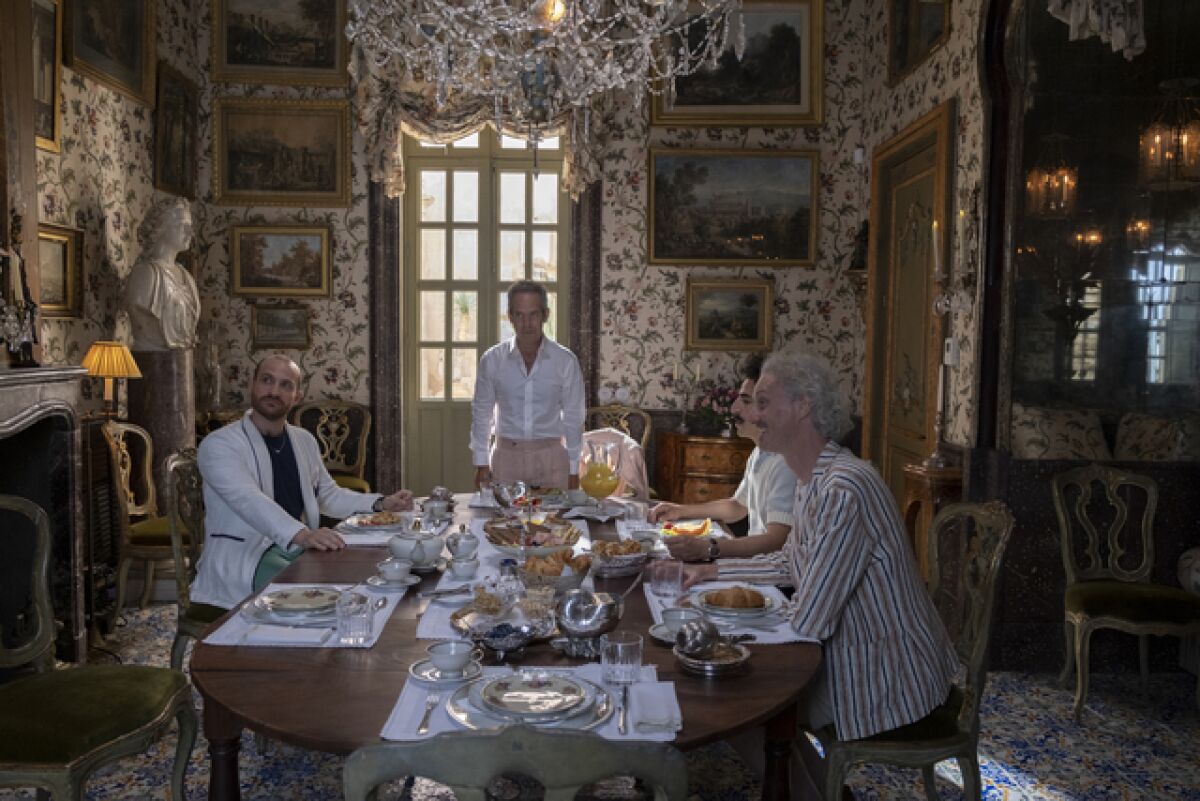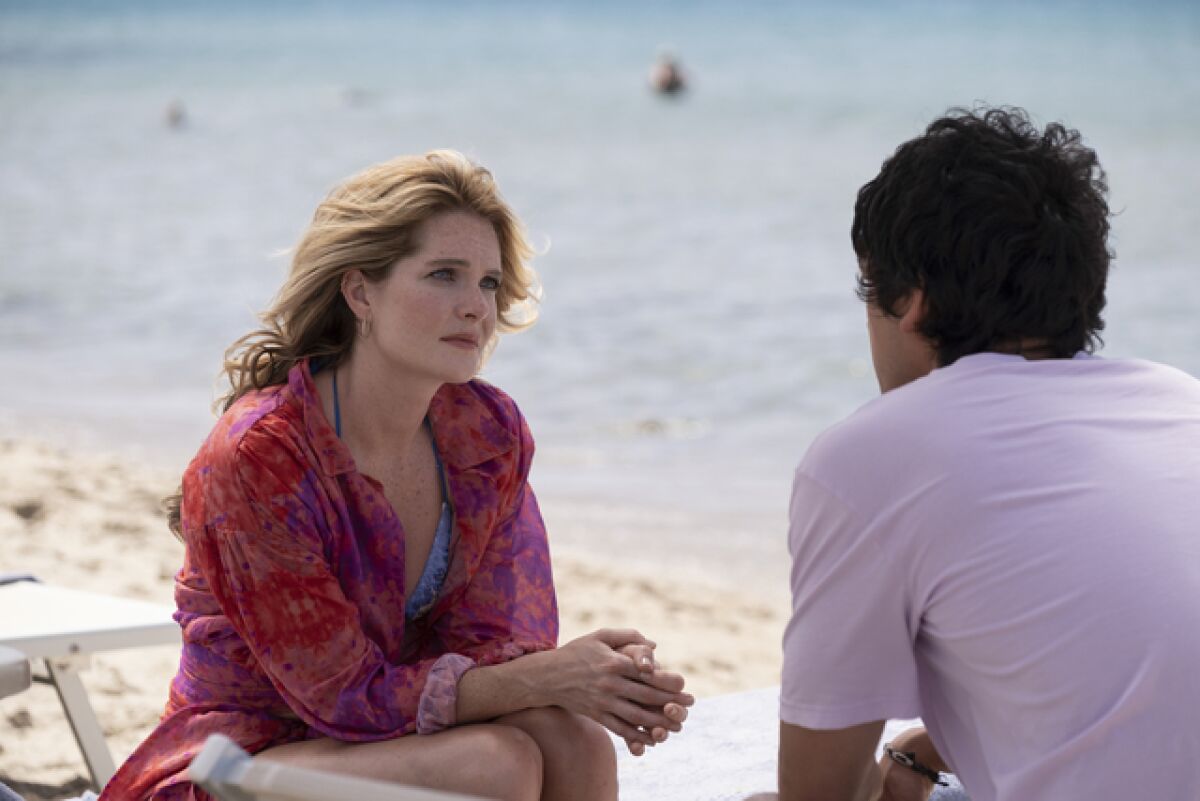Let’s break down that ‘White Lotus’ finale: Our biggest surprises, disappointments
Warning: The following contains spoilers from the Season 2 finale of “The White Lotus.”
The season that launched a thousand theories concluded Sunday night with “Arriverderci,” as “White Lotus” creator Mike White and company bade farewell to Sicily in a super-sized 77 minute finale. Neither predicted the ending correctly (not even close), but columnist Mary McNamara and deputy editor Matt Brennan weren’t too ashamed to break down every twist and turn in the episode. Here’s their post-mortem:
Mary McNamara: Let’s hear it for Mike White, who churned up the Ionian sea with so many red herrings that we couldn’t believe the corpse in the water would be the obvious choice — Tanya (Jennifer Coolidge), with the big fortune and the duplicitous husband. (Though there was definitely some, er, fishy editing in the original discovery scene, because I know there was not a hint of hot pink floral in the water.)
None of our predictions were right, Matt! None! In part, I think, because we didn’t believe White would kill off Jennifer Coolidge.
I admit it blinded me from what I knew to be true: From the moment Tom Hollander showed up in full evil-Tom-Holldander drag I knew he was going to try to kill Tanya — ladies, never get on a boat with a jaded Brit named Quentin who has an Italian villa and no discernible income. When Tanya saw the gun in Niccolo’s bag during the penultimate episode, many people assumed (rightly) that the gun it would go off in the finale. But I don’t think anyone saw Tanya’s Dirty Harry moment coming.
Honestly, the sight of Coolidge blasting her way through that tastefully appointed yacht was so satisfying that I am officially willing to forgive all the ridiculous plot twists and heavy-handed tension-building of this season. And she killed them all with her eyes closed!
That said, I was disappointed when she fell off the yacht to her death. I kept thinking, ‘Why is she jumping? There must be a better way to get down to the dingy.’ Now Greg inherits! Which doesn’t seem fair at all.
What do you think?

Paolo Camilli, from left, Tom Hollander, Bruno Gouery and Francesco Zecca as Tanya’s conniving gay friends in “The White Lotus.”
(Fabio Lovino/HBO)
Matt Brennan: After we published theories from the Times’ “White Lotus” watchers on Friday, an HBO insider reached out to me with a cryptic message: “Remember, it’s a tragedy!”
So perhaps I should have known better — and yet I audibly gasped when Tanya’s head hit the railing of the boat where Niccolo had been plotting to do away with her. I even half-expected her to open her eyes as she floated in the water, so fully had I convinced myself that White and Coolidge would never part. And while I am disappointed in the outcome, largely because it’s been such a thrill to see Coolidge win acclaim, an Emmy and new opportunities from the role, I am a student of the Ned Stark School of TV Deaths: To achieve genuine surprise, as White did here, you have to kill your darlings.
Whether it was in support of the most compelling finale he could have crafted from the ocean of possibilities going in is another matter entirely. Just before Tanya started shooting up that boat — the image that popped into my head was De Niro in “Taxi Driver,” for what it’s worth — I found myself checking my watch, a sign of the episode’s tediously portentous construction. Between the close-ups of paintings and sculptures, the slow-motion inserts of crashing and retreating waves and the thunderous thud of Cristobal Tapia de Veer’s score, I finally felt White straining Sunday to keep the plates spinning after a season that roped me in, bit by bit, with its everything-but-the-kitchen-sink approach. And I ended up feeling deflated by the conclusion of just about every subplot.
In a way, Tanya’s death also killed off any possibility of a dramatically satisfying conclusion to the other storylines: Portia’s (Haley Lu Richardson) culminating confrontation with Jack (Leo Woodall) came out as a sad whimper. Daphne (Meghann Fahy) and Cameron (Theo James) and Ethan (Will Sharpe) and Harper (Aubrey Plaza) decided to let bygones be bygones, or pretend to. And the Di Grassos, Bert (F. Murray Abraham), Dominic (Michael Imperioli) and Albie (Adam DiMarco), appear to be headed home to L.A. more or less unchanged, if out of 50,000 euros. Even the season’s “winners,” Lucia (Simona Tabasco) and Mia (Beatrice Grannò), we glimpse only briefly, on a Taormina shopping spree, before the credits.
Then again, my own finale theory emphasized the season’s disaffection and ennui. So maybe I should have predicted my own let down. Were you satisfied by the finale beyond the Kill Tanya conspiracy unraveling (and accidentally succeeding)?
McNamara: Although last season also began with mention of a murder, it was much more of a social excavation, and satire. This season leaned hard into the larger whodunnit renaissance — “Knives Out” meets one of Agatha Christie’s beach resort novels. Pretty much from the word go, the audience was trying to figure out who killed whom with what and why. I thought it was clever of White to dispose of at least one favorite theory — that Ethan killed Cameron — right up front. But I think cleverness worked against this season most of the time.
At the beginning, it seemed that White was going to disembowel the notion of romance (Italy!) as thoroughly as he eviscerated relaxation (Hawaii!). But with murder so predominant, the characters and relationships were interesting only as pieces of a larger puzzle. Fahy made Daphne the series’ most interesting character in part because she actually seemed to be on vacation, and you could see her existing in an Christie novel. (Darling, I simply must have a pink gin.)
The rest of them not so much.
Did I care if Ethan and Harper re-ignited their marital spark? As much as I love Plaza and found her performance in the early episodes hilarious, I did not. “Do some more sight-seeing,” I wanted to scream. “Go somewhere besides the hotel for dinner.”
Nor did I give a fig, or an olive, whether or not the Di Grassos found their long-lost relatives or, in the case of père and grand-père, their equally elusive consciences. (Though I definitely appreciated any scene in which they were not tediously discussing their views on gender or, heaven help us, “The Godfather.”)
Tanya remained a goddess but Portia was a drip (though I kind of liked Jack). I’m not sure what we were supposed to think about Mia and Lucia — Grannò was lovely to watch and hear, and I suppose I’m glad they “won,” but I’m never a big fan of story lines that suggest women can get ahead by using their feminine wiles.
I agree that that the season felt strangely over-stuffed and empty. White seemed to want his “Knives Out” and his seven episodes too. There were definitely bright spots — Coolidge rocking taffetta, Hollander dropping insinuating bon mots, Plaza aggressively eating toast and Fahy offering marital advice. But with all the ominous music and shots of those Moorish heads, White seemed determined to make us anxious for the reveal, i.e., the end, which is never a good thing for a character-led drama.

Meghann Fahy, with Will Sharpe, in the Season 2 finale of “The White Lotus.”
(HBO)
Brennan: Fahy, as if to illustrate your point, lands the finale’s most potent punch with a mere expression, breaking like a wave across her face, as Ethan details his suspicions about Harper and Cam in a conversation with Daphne on the beach shortly after the boys’ wet T-shirt contest… I mean showdown. That character, and that performance, have supplied what pathos there might be in the plight of the rich this season, and Daphne’s advice to Ethan comes with a subtle ache that I wish White had spent more time searching for amid the bombast. “I think,” she says, clearly speaking from experience, “you do whatever you have to not to feel like a victim of life.”
That, for me, was the high-water mark of the season, along with Daphne and Harper’s stoned night in the palazzo and the dueling dates between Albie/Lucia and Portia/Jack — moments that managed the same feat as White’s enduring masterpiece, “Enlightened,” effortlessly weaving together the comedy of human frailty with its infinite sadness. As for the rest, like many resort vacations, I am already struggling to recall it; it’s not that it was unpleasant so much as unremarkable, each episode blurring into the next as surely as those dinners at the restaurant hotel.
I suppose, in a way, this is the point: The class satire you mention is, fundamentally, of wealthy Americans sojourning thousands of miles in search of a carefully curated facsimile of the “foreign,” not an actual face-to-face meeting with local people, cultures or customs. But unlike, say, Luca Guadagnino’s “A Bigger Splash,” “The White Lotus” goes to no great lengths to suggest the world beyond the resort property — Lucia and Mia are largely treated as the molls in White’s own “Godfather,” and Valentina’s (Sabrina Impacciatore) first queer sexual experience comes with a tacit quid to its quo. The series’ vision of Hawaii at least mentioned colonialism. All the Sicilians get are arancini and a volcano.
In the final estimation, then, I found this season much like its characters: too cynical by half, sometimes frustratingly, sometimes fittingly, always a little shallowly. “How are you going to make it in life if you’re this big a mark?” Dominic asks Albie in “Arriverderci” after the latter requests the “karmic payment” to Lucia, but even the season’s biggest naif has learned how to go for the jugular. “Give me 50,” he demands finally, “and I’ll help you with mom.” Maybe this is the tragedy my source at HBO was referring to — the tragedy of people in stunted, transactional, fundamentally dishonest relationships who nonetheless cling to them, because it’s all they have.
That or Greg getting away with Tanya’s money. That sucks.
For all the latest Entertainment News Click Here
For the latest news and updates, follow us on Google News.
